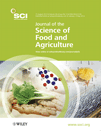
JOURNAL OF THE SCIENCE OF FOOD AND AGRICULTURE
Scope & Guideline
Elevating the science of food and agriculture.
Introduction
Aims and Scopes
- Food Quality and Safety:
Research on the preservation, safety, and quality of food products, including studies on microbial contamination, antioxidant properties, and the effects of processing methods. - Nutritional and Functional Properties:
Exploration of the nutritional composition of various food sources, including the bioavailability of essential nutrients and the impact of dietary components on health outcomes. - Innovative Food Processing Techniques:
Development and evaluation of novel food processing methods, such as ultrasound-assisted extraction, high-pressure processing, and fermentation technologies to improve food quality and safety. - Environmental Sustainability in Agriculture:
Studies focusing on sustainable agricultural practices, including the use of biostimulants, crop management strategies, and the impact of climate change on crop yield and quality. - Biotechnology Applications in Food and Agriculture:
Research utilizing biotechnological approaches to enhance food production, quality, and safety, including genetic modification, fermentation, and the use of probiotics. - Food Waste Valorization:
Innovative methods for converting food waste into valuable products, emphasizing sustainability and resource efficiency.
Trending and Emerging
- Plant-Based Proteins and Alternatives:
An increasing focus on the development and utilization of plant-based proteins and alternative ingredients in food products, catering to the growing demand for vegetarian and vegan options. - Functional Foods and Nutraceuticals:
A trend towards investigating foods with added health benefits, including probiotics, prebiotics, and bioactive compounds that contribute to health promotion. - Sustainable Agriculture Practices:
Research on sustainable farming practices is gaining momentum, emphasizing climate-resilient techniques, soil health improvement, and resource use efficiency. - Food Waste Reduction and Valorization:
A growing interest in innovative strategies for reducing food waste and converting by-products into value-added products is emerging. - Smart Agriculture Technologies:
The integration of digital technologies such as machine learning, remote sensing, and data analytics in agriculture to enhance productivity and sustainability is becoming increasingly prevalent. - Microbiome Research in Food Systems:
Emerging research on the role of microbiomes in food production, safety, and health, including the impact of gut microbiota on metabolic processes and health outcomes.
Declining or Waning
- Traditional Food Preservation Methods:
Research on conventional preservation techniques such as canning and salting has decreased, as newer technologies like high-pressure processing gain traction. - Chemical Additives in Food Processing:
The focus on chemical preservatives and additives appears to be waning, with a greater emphasis on natural alternatives and clean label products. - Single Crop Studies:
There is a noticeable decline in research solely focused on single crop studies, with a shift towards integrated approaches that consider intercropping and polyculture systems. - Animal-Based Food Processing:
Interest in research focused exclusively on traditional animal-based food processing methods is declining, potentially due to the rising popularity of plant-based alternatives. - Conventional Fertilizer Use:
Research emphasizing conventional fertilizers is decreasing as the field shifts towards organic and sustainable fertilization techniques.
Similar Journals

ITALIAN JOURNAL OF FOOD SCIENCE
Elevating Global Knowledge in Food ScienceITALIAN JOURNAL OF FOOD SCIENCE is a distinguished open-access publication dedicated to advancing knowledge in the field of food science, catering to a global audience of researchers, professionals, and students. Published by Codon Publications in Singapore, this journal, operating under the ISSN 1120-1770 and E-ISSN 2239-5687, has been a vital platform for scholarly discourse since its inception in 1996, converging towards a comprehensive view of food science trends through 2024. With an impressive ranking in the third quartile (Q3) of the Food Science category and a Scopus rank of #151 out of 389, the journal plays a significant role in disseminating high-quality research, contributing to a richer understanding of food science within the agricultural and biological sciences. Since transitioning to open access in 2008, it has further expanded its reach, ensuring that innovative research is accessible to all, thereby fostering collaboration and knowledge exchange in this vital industry.

International Food Research Journal
Bridging Disciplines in the World of Food ResearchThe International Food Research Journal, published by UNIV PUTRA MALAYSIA PRESS, serves as a pivotal platform for disseminating innovative research within the field of food science. With an ISSN of 1985-4668 and an E-ISSN of 2231-7546, the journal has successfully established its presence since its inception in 2007, converging its findings through 2024. This esteemed journal holds a Q3 ranking in Food Science, illustrating its valuable contributions to the field as demonstrated by its Scopus rank of 276 out of 389, placing it in the 29th percentile among its peers in Agricultural and Biological Sciences. Although it operates under a traditional publishing model, its academic integrity and focus on high-quality research ensure that it remains a vital resource for researchers, professionals, and students eager to explore advances in food technology, nutrition, and safety. By encouraging interdisciplinary collaboration and critical dialogue, the International Food Research Journal plays an essential role in shaping the future of food science research.
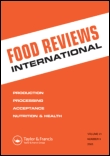
FOOD REVIEWS INTERNATIONAL
Exploring Innovations for a Sustainable Food FutureFOOD REVIEWS INTERNATIONAL, published by Taylor & Francis Inc, serves as a pivotal resource within the fields of Food Science and Chemical Engineering. Established in 1985, this esteemed journal offers a comprehensive platform for the dissemination of critical reviews that enhance understanding and innovation in the food industry. With an impressive impact factor reflecting its Q1 quartiles in both Food Science and Chemical Engineering categories, it ranks among the top journals in Scopus, securing the 24th spot in Agricultural and Biological Sciences. Scholars, researchers, and professionals are encouraged to explore its rich content, which spans meticulously reviewed articles that bridge academic research and practical applications, while contributing to advancements in food safety, processing, and sustainability. Although not an Open Access journal, access to its extensive repository is vital for anyone aiming to stay at the forefront of food science advancements.

Food Production Processing and Nutrition
Connecting food production and nutrition for global impact.Food Production Processing and Nutrition, published by SpringerNature, stands at the forefront of advancing knowledge in the vibrant fields of food science, nutrition, and public health. This esteemed Open Access journal, operational since 2019, plays a pivotal role in disseminating breakthrough research that intersects food production processes with nutritional insights, making it an invaluable resource for researchers, professionals, and students alike. With a commendable 2023 impact factor reflecting its robust scholarly contributions — Q1 in Food Science and Q2 in both Nutrition and Dietetics and Public Health, Environmental and Occupational Health — the journal not only emphasizes the importance of innovative food processing methods but also addresses pressing nutritional challenges faced globally. Located in the United Kingdom, it claims an impressive Scopus ranking, with a notable percentile standing across various categorical metrics. As such, Food Production Processing and Nutrition is essential for anyone aiming to deepen their understanding of how food systems impact public health through effective processing and nutritional strategies.
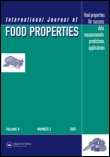
INTERNATIONAL JOURNAL OF FOOD PROPERTIES
Transforming food science through open access research.INTERNATIONAL JOURNAL OF FOOD PROPERTIES, published by TAYLOR & FRANCIS INC, is a leading platform for disseminating high-quality research in the field of food science. With an ISSN of 1094-2912 and E-ISSN of 1532-2386, this journal has been committed to open access since 2018, ensuring that groundbreaking studies are readily available to global audiences. The journal has steadily gained recognition for its contribution to the discipline, achieving a Q2 ranking in Food Science and placing in the 68th percentile among its peers according to Scopus metrics. Covering a wide array of topics related to the properties and applications of food, it serves as a valuable resource for researchers, professionals, and students alike. With coverage extending from 1998 to 2024, the journal continually seeks to advance knowledge and foster innovation within the food science community, making it a pivotal publication for anyone serious about this vital field.
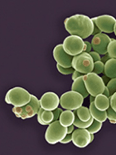
Annual Review of Food Science and Technology
Transforming Food Science Through Comprehensive ReviewsThe Annual Review of Food Science and Technology, published by ANNUAL REVIEWS, is an esteemed journal dedicated to advancing the knowledge within the field of food science. With an impressive Q1 ranking in the Food Science category, and ranking as #6 out of 389 in the Scopus Agricultural and Biological Sciences category, the journal serves as a vital resource for researchers, professionals, and students. This publication encapsulates comprehensive reviews and cutting-edge research, helping to bridge the gap between research and practical application. Though it does not offer Open Access, it provides valuable insights into various aspects of food science from 2010 to 2024, ensuring that its readership stays at the forefront of emerging trends and innovations. The journal's focus on high-quality, peer-reviewed articles makes it a critical platform for scholars looking to deepen their understanding and contribute to this rapidly evolving field.
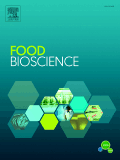
Food Bioscience
Pioneering Research at the Intersection of Food and BiologyFood Bioscience is a leading peer-reviewed journal published by Elsevier, dedicated to advancing the understanding of the complex interplay between food science and biosciences. With an impressive Impact Factor that places it in the Q1 and Q2 quartiles for Food Science and Biochemistry respectively, the journal consistently ranks among the top publications in its field, reflected in its Scopus rankings (Rank #83/389 in Food Science and Rank #175/438 in Biochemistry). Since its inception in 2013, Food Bioscience has fostered a multidisciplinary approach, bridging gaps between research in agricultural, biological, and food sciences, thus encouraging innovative solutions to the pressing challenges facing the global food supply chain. Although it currently operates under a subscription model, the journal is committed to disseminating high-quality research, making significant contributions to both academic scholarship and industry practices. Researchers, professionals, and students alike are invited to explore the wealth of knowledge contained within its pages as it plays a pivotal role in shaping the future of food bioscience.
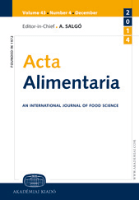
ACTA ALIMENTARIA
Connecting research and practice in food technology.ACTA ALIMENTARIA is a renowned journal in the field of food science, published by AKADEMIAI KIADO ZRT, based in Hungary. Since its inception in 1973, it has served as a vital platform for disseminating high-quality research on food chemistry, microbiology, nutrition, and technology, contributing significantly to the advancement of knowledge in the agricultural and biological sciences. Currently classified in the Q3 quartile of the 2023 Food Science category, the journal is positioned to address pressing issues pertaining to food safety, quality, and sustainability, making it an invaluable resource for researchers, professionals, and students alike. Although it does not currently offer open access, the journal maintains a strong reputation with a readership keenly interested in the latest developments in food science. With a Scopus rank placing it in the 38th percentile of its category, ACTA ALIMENTARIA continues to be a pivotal reference for those engaged in food research and innovation.
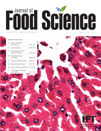
JOURNAL OF FOOD SCIENCE
Pioneering Insights in Culinary Science and TechnologyJOURNAL OF FOOD SCIENCE, published by Wiley, is a premier journal dedicated to advancing the field of food science, bridging the gap between fundamental research and practical application. With an impressive impact factor reflecting its authoritative status, the journal is ranked in the Q1 quartile for Food Science in 2023 and boasts a Scopus ranking of #71 out of 389, placing it in the 81st percentile within Agricultural and Biological Sciences. First launched in 1936, the journal continues to serve as an essential platform for researchers, professionals, and students to disseminate innovative studies and reviews that address critical issues in food quality, safety, and technology. While not currently offering open access, its rigorous peer-review process ensures the dissemination of high-quality and impactful research. Researchers engaged in the vital disciplines of food science will find this journal indispensable for keeping abreast of cutting-edge developments in the field.
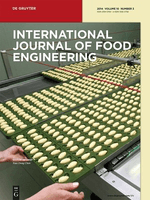
International Journal of Food Engineering
Pioneering Research for a Sustainable Food FutureThe International Journal of Food Engineering, published by WALTER DE GRUYTER GMBH, serves as a pivotal platform for cutting-edge research in the field of food engineering. With an ISSN of 2194-5764 and an E-ISSN of 1556-3758, this journal focuses on innovative technologies, production processes, and quality control within food systems. Located in Germany, the journal has gained notable recognition, as reflected in its Scopus rankings, which place it within the 61st percentile in miscellaneous engineering and the 50th percentile in food science. Although it operates under a traditional access model, the journal's striking category quartiles signify its importance: achieving Q2 in Engineering and Q3 in both Biotechnology and Food Science in 2023. By fostering interdisciplinary research, the International Journal of Food Engineering aims to connect scientists, engineers, and industry professionals, ultimately contributing to advancements in food safety, sustainability, and nutrition. Join a vibrant community of experts driving innovation and addressing global food challenges through your contributions to this esteemed journal.